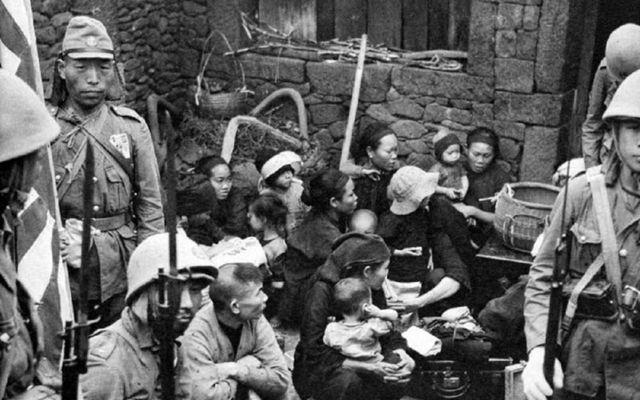Due to the corruption and incompetence of the Qing government, Western powers invaded China one after another, and Japan also took advantage of the situation to occupy China. After 8 years of anti-Japanese war, the Chinese finally won. It officially came to an end on September 3, 1945. During this period, a series of songs propagating the Anti-Japanese War emerged, inspiring the Chinese spiritually.
The 7 Anti-Japanese War Songs in China
1. “March of the Volunteers” 义勇军进行曲
Lyricist: Tian Han Composer: Nie Er
“March of the Volunteers” was originally the theme song composed by Nie Er for the film “Children of the Storm” in 1935. This film describes the story of Chinese intellectuals represented by the poet Xin Baihua in the early 1930s, in order to save the motherland, they wrote and joined the army, went to the front line of the Anti-Japanese War, and heroically killed the enemy.Later, the March of the Volunteers was chosen as the national anthem of the People’s Republic of China.
2. “Song Hua Jiang Shang” 松花江上
Lyricist/Composer: Zhang Hanhui
This is an anti-Japanese song that has been widely sung among the Chinese people for half a century. The song sings: “September 18, September 18, from that tragic time…” This was accompanied by blood and tears, accusing The “September 18 Incident” launched by the Japanese imperialists in 1931 exposed the Japanese imperialists’ occupation of the three northeastern provinces of China, and then launched an all-out war of aggression against China and brutally plundered the Chinese people.
3. “Defend the Yellow River” 保卫黄河
Lyricist: Guang Weiran Composer: Xian Xinghai
After the fall of Wuhan in 1938, the poet Guang Weiran led the third anti-enemy drama team to cross the Yellow River eastward from Hukou in Yichuan County, Shaanxi Province, and transfer to the Luliangshan Anti-Japanese Base. On the way, I listened to the long, high-pitched, deep and powerful chants of the boatmen on the Yellow River. After returning to Yan’an in 1939, Guang Weiran recited the lyrics of “The Yellow River” at a party. After listening to it, Xian Xinghai expressed that he would compose “Yellow River Cantata” and completed this large-scale vocal masterpiece. On April 13, 1939, the “Yellow River Cantata” premiered in the auditorium of Yan’an North Shaanxi University, which aroused great repercussions, and “Defend the Yellow River” soon spread throughout China.
4. “Da Dao Jin Xing Qu” 大刀进行曲
Lyricist/Composer: Mai Xin
After the July 7th Incident, the heroic anti-Japanese deeds of the 29th Army Broadsword Team greatly inspired the people of the whole country. Sun Peiyuan (also known as Mo Xin, later pseudonym Mai Xin), a progressive youth working in Shanghai at that time, composed a song full of patriotic enthusiasm, which soon became a well-known song during the Anti-Japanese War. March”.
5. “Xin Bian Jiu Yi Ba Xiao Diao” 新编九一八小调
Lyricist/Composer: Lu Ji
Lv Ji, formerly known as Lv Zhanqing, is a native of Xiangtan, Hunan Province. He has loved music since childhood and can play a variety of ethnic musical instruments. Since the 1930s, Lv Ji has created many excellent musical works, such as “New “Nine-18″ Minor”, “Defending Madrid”, “Railway Workers Song” and so on.
6. “Graduation Song” 毕业歌
Lyricist: Tian Han Composer: Nie Er
Written in 1934, it was originally the theme song of the film “Peach Blossom Tribulation”. The film describes the bumpy life of Chinese young students after the “September 18” Incident. Because the song expresses the patriotic passion of a generation of young people, “every man is responsible for the rise and fall of the world”, it is deeply loved by the general public, especially young students.
7. “You Ji Dui Zhi Ge” 游击队之歌
Composer/Lyricist: He Luting
After the “August 13” Incident, the author went north with the Shanghai Cultural Rescue Team to do anti-Japanese propaganda. He composed this song to all the soldiers of the Eighth Route Army. The first performance was warmly welcomed.